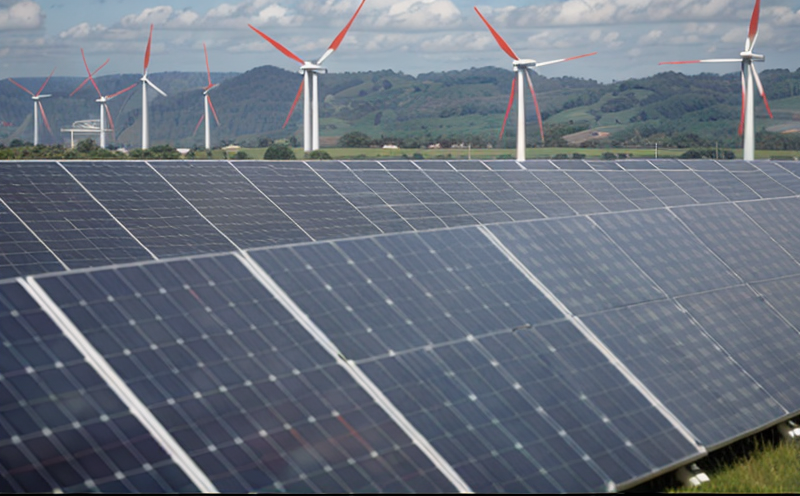Bulk Density Measurement of Biomass
Understanding the bulk density of biomass is crucial in agriculture and forestry testing, especially within renewable energy systems. Bulk density refers to the mass per unit volume of a material that includes its natural voids or interstitial spaces. In biomass applications, this measurement helps optimize storage capacity, transportation efficiency, and combustion performance.
Biomass materials such as wood chips, sawdust, pellets, and agricultural residues are not uniform in structure. Variations in moisture content, particle size distribution, and shape can significantly affect the bulk density. For instance, a higher bulk density indicates tighter packing of biomass particles, which is desirable for efficient energy conversion processes like biofuel production or biomass boilers.
The measurement of bulk density helps ensure consistent quality across different batches of biomass feedstock. This consistency is vital for maintaining optimal combustion conditions in renewable energy systems, thereby enhancing the efficiency and reducing operational costs. Proper measurement also aids in accurate inventory management and facilitates better logistical planning by estimating storage space requirements accurately.
Accurate determination of bulk density involves careful sampling techniques to ensure representativeness. Samples must be taken from multiple locations within a batch to capture variations in material properties. After collection, samples are dried under controlled conditions if necessary, then sieved or crushed to standard particle sizes before weighing and measuring volume. Various methods can be employed depending on the type of biomass:
- For loose materials like sawdust, displacement methods using known volumes of containers.
- For compacted materials such as pellets, direct measurement using calibrated instruments.
The choice of method impacts the precision and accuracy of the measurement. Industry standards such as ISO 17824 provide guidelines for bulk density determination in biomass samples. Compliance with these standards ensures consistent results across different laboratories and facilities.
Efficient energy conversion from biomass relies heavily on precise knowledge of its physical characteristics, including bulk density. This information is essential for designing efficient combustion systems that can handle varying feedstock types effectively. By optimizing the packing density within reactors or boilers, one can improve heat transfer rates and overall system performance. Furthermore, understanding how changes in moisture content affect bulk density allows for better management of storage conditions to preserve fuel quality.
In summary, accurate measurement of bulk density plays a pivotal role in ensuring reliable performance of renewable energy systems that utilize biomass as a primary resource. It supports critical decisions related to feedstock selection, processing strategies, and system design, ultimately contributing to more sustainable and economically viable operations within the agricultural and forestry sectors.
Industry Applications
- Biofuel Production: Ensuring consistent bulk density helps in optimizing the efficiency of biofuel production processes. Higher packing densities lead to better fuel quality, reducing waste and improving yield.
- Biomass Boilers: Accurate bulk density measurements help maintain optimal combustion conditions by ensuring proper feeding rates into boilers, thus enhancing energy output while minimizing emissions.
- Agricultural Residues Utilization: For converting agricultural residues into bioenergy or compost materials, knowing the exact bulk density allows for better planning of storage facilities and processing methods.
The application of these principles extends beyond just production processes. In research and development environments, understanding how different factors influence bulk density can lead to innovations in material handling technologies and process optimization techniques. For example, developing new types of biomass briquettes or pellets that maintain consistent packing densities during transportation and storage.
Eurolab Advantages
At Eurolab, we offer comprehensive bulk density measurement services tailored specifically for agricultural and forestry testing within renewable energy systems. Our expertise lies in providing precise and reliable data through advanced instrumentation and experienced personnel. Here’s why choosing us is advantageous:
- Accurate Results: Utilizing state-of-the-art equipment and adhering strictly to international standards like ISO 17824 ensures that our measurements are accurate and replicable.
- Comprehensive Testing Capabilities: Our laboratory offers a wide range of testing services, including but not limited to moisture content analysis, calorimetry, and particle size distribution tests, which complement bulk density measurement for a holistic view of biomass quality.
- Expertise in Biomass: With years of experience working with various types of biomass materials, our team understands the unique challenges associated with these samples. This knowledge translates into more informed recommendations regarding optimal feedstock handling and processing methods.
- Client Support: From initial consultation to final report delivery, we provide personalized support tailored to each client’s needs ensuring smooth communication throughout the testing process.
We take pride in delivering not just numbers but actionable insights that help our clients make informed decisions about their renewable energy projects involving biomass. Whether you need assistance with routine quality control checks or complex research studies, Eurolab is committed to providing top-notch services aligned with your objectives.
Customer Impact and Satisfaction
Our clients have consistently praised Eurolab’s bulk density measurement services for their reliability and accuracy. By partnering with us, they gain confidence in the quality of biomass materials used in renewable energy projects, leading to improved project success rates.
- Increased Efficiency: Accurate measurements enable better resource utilization, reducing waste and improving productivity across all stages of production.
- Better Decision-Making: Insight into bulk density helps stakeholders make well-informed decisions about procurement strategies, processing methods, and system design.
- Enhanced Sustainability: Through precise measurements, clients can implement practices that minimize environmental impact while maximizing resource efficiency.
The positive feedback received from our clients underscores their satisfaction with the service provided by Eurolab. Our commitment to excellence ensures that every project receives top-notch support, ultimately contributing to a more sustainable future in agriculture and forestry testing within renewable energy systems.





